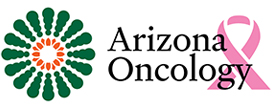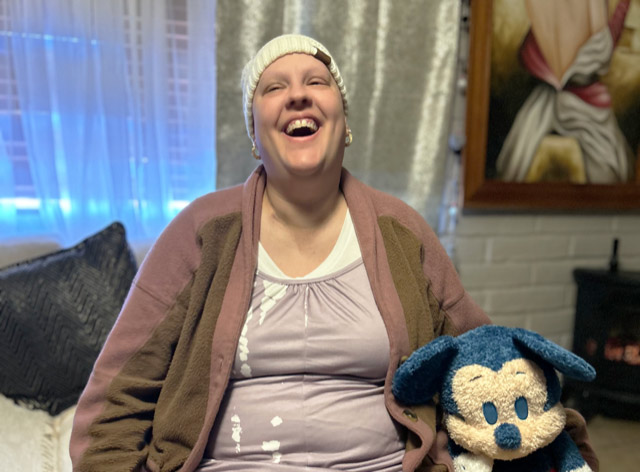Thirty-eight year old Mandy Hanlon did not expect to get a cancer diagnosis when she arrived at her job as a pharmacy tech on a typical day in August of 2023. She describes what she thought was a sudden onset of nerve pain. Her legs “wouldn’t do what I was telling them to,” and she experienced an abrupt bout of numbness followed by pain.
“The pharmacist saw how much pain I was in and called my dad to pick me up, and we went to Northwest Hospital,” Mandy recalls. “They did a test on me and saw a mass on my back. After tests and more tests, they found out I had stage four bone cancer and tumors in my lungs.”
The diagnosis was Ewing Sarcoma, a very rare form of bone cancer usually found in young people. The doctor she saw first was Arizona Oncology radiation oncologist Dr. Hayden Ansinelli, who reassured her and immediately teamed up with medical oncologist Dr. Rachel Swart to reach out into the medical community to ask about treatment options for the disease. “I can’t thank him enough,” Mandy says.
“Ewing Sarcoma is a rare form of cancer affecting only one out of one million people in the U.S.,” explains Dr. Swart. “Most cases occur in children and adolescents, but there are rare cases that occur in patients over the age of 20.” Ewing Sarcoma affects males more than females, often between the age of 10 and 20, and is found mostly in people of European descent. Ewing Sarcoma is also associated with certain genetic predispositions such as neurofibromatosis, Li Fraumani’s Syndrome, and retinoblastoma.
Dr. Swart goes on to explain that Ewing Sarcoma is potentially curable with a 5-year survival rate around 80% for people whose cancer hasn’t spread. However, for adults the survival rates are lower. Symptoms include bone pain at the tumor site, swelling/redness around the tumor site, fever, weight loss/decreased appetite, fatigue, paralysis and/or incontinence, and nerve compression symptoms such as numbness and tingling.
Initially, Mandy did not want to pursue treatment because of the uncertainty surrounding her disease and prognosis, but her cousin and biggest advocate, Layla, convinced her to try it once to see if it helped. After the first chemo regimen, they saw a reduction in the size of the tumor on her spine, so Mandy decided to move forward with treatment.
The chemotherapy made her quite sick for several weeks, but it was her family and her doctors and nurses who got her through it. During her sometimes 8-hour-long daily chemo treatments, there would be a family member at her side. “I was scared, but all the nurses were amazing. They were my angels,” Mandy says. Mandy had a scare at one point with a complication with her chemo port where her lung filled with blood. “I was so thankful to see my dad when I woke up,” she recalls.
Mandy says her family relationships have been strengthened because of what she’s gone through, especially her relationship with her dad. She adds that the most important thing her caregivers have done for her is to act as her advocate. “There were times when I was on so many pain meds that I couldn’t think or talk, and it was my cousin making sure I understood everything.” Layla also helped her avoid the fees associated with exiting her lease early and made sure she got medical coverage through AHCCCS.
After completing treatment, Mandy reports that while her life has been irrevocably changed by her diagnosis, she’s grateful to be alive. “I will never be able to walk right again, and I am tired all the time, but I am very, very grateful for all the little things, and I try to enjoy the moments more,” she says. On her bucket list is a trip to Disneyland, which she hopes to do in March.
Mandy plans to donate her body to a research facility in the hopes that it will be able to help future Ewing Sarcoma patients, but she has already had a profound impact on those around her. The doctors and nurses at Arizona Oncology have felt it—a sort of gentle groundedness even in the midst of the tumult of emotions cancer brings. When Mandy’s name comes up, they smile. “Wait till you meet her,” they say. And they aren’t wrong. There’s something special about Mandy that everyone who meets her can feel.
“This cancer has changed my life,” Mandy says. “I love myself more now, and I’m so grateful for my family—my dad Michael and stepmother, Alma; they opened a room in their house for me and made me feel comfortable. I am also grateful for my cousin Layla—she was my voice when I was in the hospital, and my Aunt Margie and my sister Shanteal and so many more angels I have around me.”
Mandy encourages others facing a cancer diagnosis to always have faith and look ahead despite the uncertainty and challenges.
“It’s okay,” she says. “Never give up on yourself and keep moving forward.”



